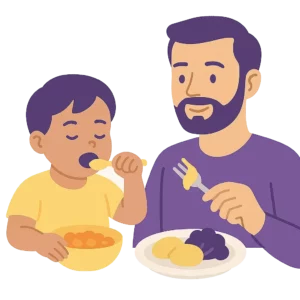
Personalized, Compassionate Support for Safe and Effective Mealtimes
Feeding and swallowing disorders—also known as dysphagia—can impact individuals of all ages, from infants to older adults. These conditions can make it difficult to chew, swallow, or enjoy meals safely and comfortably. Without proper treatment, they may lead to malnutrition, aspiration, weight loss, dehydration, or reduced quality of life.
We are proud to use the SOS (Sequential Oral Sensory) Approach—a research-based, play-centered feeding therapy model designed to build trust and improve food interaction step by step.
Call us at (845) 360-9323 or request an appointment to schedule your initial evaluation. We’re here to help every mealtime feel safer, more successful, and more enjoyable.